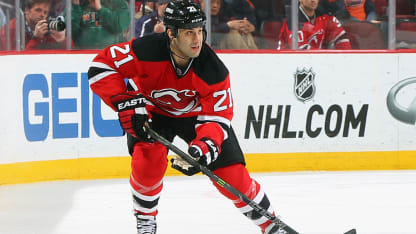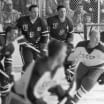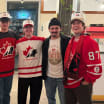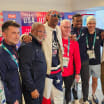Scott Gomez has heard all sorts of tales about how he reached the NHL.
"The stories were just incredible, how I grew up in poverty and I went to major juniors to feed my family," Gomez said. "The main thing that I kind of understood was that I didn't care, if it's going to make an impact on a kid, that's what was the main thing. If they saw that a Mexican-Colombian from Alaska can play, and if it gave them a little jump, that's what I was shooting for."
The 39-year-old, who broke in with the New Jersey Devils in 1999-00, is regarded by many as the first Hispanic star in the NHL, though he wasn't the League's first player of Hispanic descent. Bill Guerin, the Minnesota Wild general manager and former forward with eight NHL teams, is part Nicaraguan and began his career with the Devils in 1991-92.
Gomez had 756 points (181 goals, 575 assists) in 1,079 games for the Devils, New York Rangers, Montreal Canadiens, San Jose Sharks, Florida Panthers, St. Louis Blues and Ottawa Senators.
He won the Calder Trophy voted as the NHL rookie of the year in 1999-2000. He helped the Devils win the Stanley Cup in 2000 and 2003, and had 101 points (29 goals, 72 assists) in 149 Stanley Cup Playoffs games. He retired in 2016 after 16 NHL seasons.
Gomez spent the past two seasons as an assistant with the New York Islanders and is now between jobs, considering options for his future.
"I've been doing hockey 36 years straight," Gomez said. "I got a couple things maybe lined up in New Jersey. I still talk to a lot of the older players, the younger guys. I'm sure as the season goes on, they'll be asking stuff. You're there to help out."
Following the advice of his father, Carlos, Gomez has embraced questions throughout his career about his heritage, though sometimes replied with tongue in cheek. For instance, when he was playing for the Sharks and had an assist on a goal by Raffi Torres, who is a Canadian of Mexican and Peruvian heritage, on April 23, 2013, against the Dallas Stars.
"Raffi and I are on a line together, we have a 2-on-1, I throw it across to him, he scores," Gomez said. "They're interviewing me, and I was like, 'This is NHL history, this is probably the greatest assist I've ever had.' The reporter had no clue, 'What do you mean NHL history?' I'm, like, 'You tell me another time a Mexican passes across on a 2-on-1 to another Mexican and he top-shelfs it?'"
With Hispanic Heritage Month concluding on Tuesday, Gomez discussed his heritage, hockey reaching out to the Hispanic community and other communities of color, and more in an interview with NHL.com.
Here are Five Questions with... Scott Gomez:


















